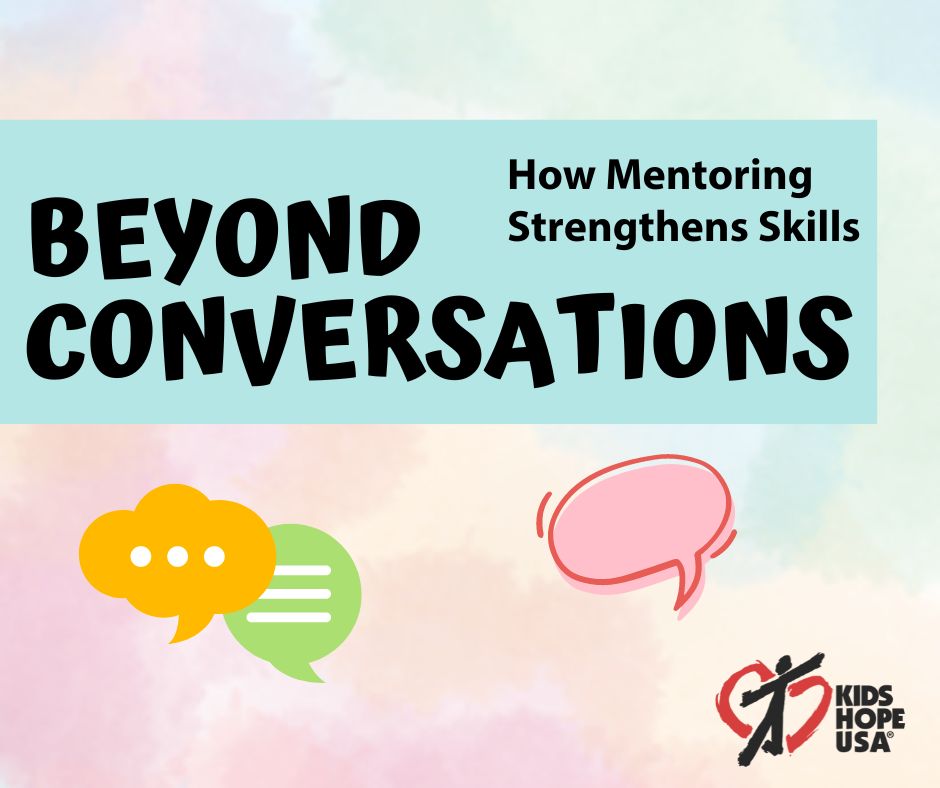
Conversation is a common activity during a Kids Hope USA mentoring hour. These conversations provide a opportunity for you and your student to catch up on the week. And your student can share what they’re looking forward to in the coming week.
Sometimes conversations between a mentor and student are easy-flowing, balanced, and engaging. Other times, a mentor may be pulling at straws in encouraging their student to engage.
However your conversations go, the mentoring hour is a valuable time for students to strengthen important conversation skills. While your topic of conversation may feel ordinary as you talk about your families or what you ate for lunch today, these conversations can actually help them practice and refine key conversational skills.
In our article, “Beyond Books & Games: How Simple Mentoring Activities Strengthen Valuable Life Skills”, we share some exciting ways that seemingly simple activities like games, reading, arts & crafts, and conversations can play a significant role in teaching your student valuable life skills.
WAYS MENTORING BOOSTS CONVERSATION SKILLS
The ability to engage in conversation is a vital skill for students to have. While all students vary in their conversational competency, your mentoring hour can be a great opportunity to help build and strengthen their skills. Here we share tips on how you can use simple conversation to boost a student’s ability to engage in and successfully communicate.
Note: those who face more significant challenges in social skills may require additional assistance beyond the tips provided in this article.
Conversations Model Positive Communication Skills
One key way you can support your student’s conversational skills is by modeling good conversational practices in your interactions. Just as you would be engaged and attentive to your student while playing a game or reading a book, be intentional about listening to your student. Notice how they are feeling as you talk with them. Be mindful of your body language as well, as your nonverbal cues comprise a significant percentage of what’s communicated.
Show your student what a thoughtful, engaged conversationalist looks like and how it makes them feel, even if you’re just discussing something simple such as weekend plans. Modeling effective communication skills like active listening and asking follow-up questions can help show your student how to engage.
Ask Open-Ended Questions
One-word responses often strain conversation. Open ended questions invite your student to expand more on the topic. Encourage your student by asking open-ended questions about themselves or about a particular topic. For example, instead of asking, “Did you have a good day today?” phrase it as “What were some of your favorite parts about today?” These open-ended questions provide a framework for students to go beyond just “yes” or “no” responses and encourage them to think and respond more completely.
Eye Contact
Appropriate eye contact is a foundational element of good conversation. Good eye contact communicates interest and attentiveness, demonstrates empathy, and helps manage feelings (MSU Extension).
Modeling appropriate eye contact—showing attentiveness without staring—can encourage your student to follow your lead. You can help encourage good conversation skills in your student by practicing maintaining eye contact with each other as you engage in conversation together.
Encourage Words to Describe Feelings & Emotions
Students experiencing a significant amount of emotion may communicate this through a range of behaviors. These situations can be great opportunities to encourage students to use words (conversation) to express and process their feelings and emotions.
Help your student to expand their vocabulary of “feeling words” to use as tools to communicate. Share adjectives that can help them better identify the feeling or emotion that they’re experiencing. For example, when a student is quieter than usual and is not making eye contact with you, ask them what words best describe what they’re feeling. A feelings chart, like those found on the Kids Hope USA portal, can be a great resource. This makes it easier for a student to identify what emotion they’re feeling, grows their emotional vocabulary, and helps them strengthen their engagement skills.
Practice Introductions
The ability to introduce yourself is a key conversational skill. Practicing this skill is certainly natural at the beginning of a new mentoring relationship, but helping your student with this skill doesn’t need to stop when you and your mentee have become acquainted. Invite them to practice introducing themselves throughout your mentoring relationship.
Encourage Turn-Taking
Just like a board game or reading together requires turn taking, conversations are also built on good back and forth between speakers. Help your student strengthen their conversation skills by encouraging them to listen well when you are talking and respond with a thought of their own. Emphasize to your student that conversations are a two-sided process. Verbally point out and praise them when you have a constructive, strengthening, back-and-forth conversation.
Use Books to Teach
Reading a book together can be a great resource in practicing conversation skills—and broader social skills. As you move through a book together, you can ask follow-up questions on what they think the main character(s) are thinking, feeling, or expressing. Identifying these emotions or characteristics can help students expand their emotional intelligence and ability to consider other perspectives, skills which are important in healthy, productive conversation.
Use Conversations to Boost Skills in Your Mentoring Hour
Conversational skills are an important part of engaging with others, regardless of age. The mentoring hour with your student can be a wonderful opportunity to help support these valuable skills. Fostering positive social skills can impact your student’s competency in interacting with others and boost their confidence.
In a Kids Hope USA mentoring program, students and mentors meet one-on-one, for one hour, once a week. This school-based mentoring program helps kids realize their importance and value as an additional caring and consistent adult shows up each week just for them. During their time together, they chat, play games, read books, do arts & crafts, and more.
Are you interested in learning more about mentoring through a Kids Hope USA program? Check out our program page!
